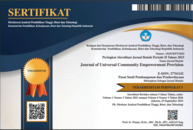An Ontological Inquiry into the Interplay between Igbo-African Culture and the Emergence of Technological Phenomena
DOI:
https://doi.org/10.55885/jucep.v5i1.259Keywords:
Technology, African thought and Values, The Role of Culture, Social and Cultural Context, Holistic ApproachAbstract
This philosophical exploration examines the emergence of technology in the Igbo-African context. Drawing on philosophical literature and Igbo cultural practices, the paper explores how technology has been understood and used in Igbo society. It considers the role of culture, ethics, and values in shaping the development of technology and highlights the importance of a holistic approach to technology that takes into account the social and cultural context in which it is used. The paper argues that a deeper understanding of the Igbo worldview and philosophy can provide insights into the ethical and social implications of technology and offer a more balanced approach to technology development and implementation. Ultimately, the paper suggests that an engagement with African philosophical traditions can enrich global discussions about technology and contribute to a more diverse and inclusive technological landscape.References
Adidi, D. T. (2024). Igwebuike Philosophy And Artifical Intelligence: An African Response. Journal of African Studies and Sustainable Development, 7(1).
Afunugo, K. N., & Molokwu, G. C. (2024). The Igbo Apprenticeship System and Socio-Economic Development of Contemporary Igbo Youths: An Ethical Reconsideration. Interdisciplinary Journal of African & Asian Studies (IJAAS), 10(2).
Amadi, L., & Agena, J. E. (2015). Globalization, Culture mutation and new identity: Implications for the Igbo cultural heritage. African Journal of History and Culture, 7(1), 16-27. https://doi.org/10.5897/AJHC2014.0212
Asiegbu, J. (1985). Traditional African societies and indigenous technology: a case study of the Umuahia-Igbo communities of South Eastern Nigeria.
Asikaogu, J. (2018). Igbo cultural values and the effect of globalization: A critical analysis. International Journal of Social Sciences and Humanities, 12(2), 42-51.
Awogu-Maduagwu, E. A., Daudu, B. O., Osimen, G. U., & Adetunji, A. (2023). Social Interactions and Relationships: Covid-19 Pandemic and the Emergence of the New Normal During the Lockdown in Universities in Nigeria. Journal of the International Society for the Study of Vernacular Settlements, 1-14.
Britz, J. J., Lor, P. J., Coetzee, I. E. M., & Bester, B. C. (2006). Africa as a knowledge society: A reality check. The International information & library review, 38(1), 25-40.
Castells, M. (1996). The Information Age: Economy, Society and Culture. Volume I. The rise of the network society.
Chen, S., Zhang, H., & Wang, S. (2022). Trade openness, economic growth, and energy intensity in China. Technological Forecasting and Social Change, 179, 121608. https://doi.org/10.1016/j.techfore.2022.121608
Danneels, E. (2004). Disruptive technology reconsidered: A critique and research agenda. Journal of product innovation management, 21(4), 246-258. https://doi.org/10.1111/j.0737-6782.2004.00076.x
Ejidike, O. M. (1999). Human rights in the cultural traditions and social practice of the Igbo of south-eastern Nigeria. Journal of African Law, 43(1), 71-98. https://doi.org/10.1017/S0021855300008731
Eke, I. W. (2023). Exploring the impact of BBC news Igbo on Revitalisation of Igbo Language (Doctoral dissertation, North-West University (South Africa)).
Ekwueme, C. S., & Onah, T. C. (2019). The influence of modernity on Igbo traditional religion and cultural values. International Journal of Management, Social Sciences, Peace and Conflict Studies (IJMSSPCS), 2(2), 82-88.
Eze, E. C. (1998). African philosophy: An anthology.
Eze, M. O. (2008). What is African communitarianism? Against consensus as a regulative ideal. South African Journal of Philosophy= Suid-Afrikaanse Tydskrif vir Wysbegeerte, 27(4), 386-399.
Ezebuilo, R. F. D. H. C. (2023). On the Interconnectedness of African Cosmology: A Study of Some Metaphysical Elements in Igbo-African Worldview. Nigerian Journal Of Philosophical Studies, 2(2).
Ezenwa, P. C. (2017). The value of human dignity: A socio-cultural approach to analyzing the crisis of values among Igbo people of Nigeria (Doctoral dissertation, Universität Würzburg).
Fouéré, M. A., & Hughes, L. (2015). Heritage and memory in East Africa today: a review of recent developments in cultural heritage research and memory studies. Azania: Archaeological Research in Africa, 50(4), 542-558. https://doi.org/10.1080/0067270X.2015.1102940
Ibidunni, O. S. (2013). Corporate social responsibility in higher education institutions in the development of communities and society in Nigeria. In Corporate social responsibility: Challenges, opportunities and strategies for 21st century leaders (pp. 235-264). Berlin, Heidelberg: Springer Berlin Heidelberg. https://doi.org/10.1007/978-3-642-40975-2_14
Igwe, P. A., Newbery, R., Amoncar, N., White, G. R., & Madichie, N. O. (2020). Keeping it in the family: exploring Igbo ethnic entrepreneurial behaviour in Nigeria. International Journal of Entrepreneurial Behavior & Research, 26(1), 34-53. https://doi.org/10.1108/IJEBR-12-2017-0492
Irielle, C. (2024). An Exploration of the Experiences of Nigerian Adult Learners Utilizing Smartphones and Associated Apps to Access Learning (Doctoral dissertation, Capella University).
Kakabadse, A., Kakabadse, N. K., & Kouzmin, A. (2003). Reinventing the democratic governance project through information technology? A growing agenda for debate. Public Administration Review, 63(1), 44-60. https://doi.org/10.1111/1540-6210.00263
Lindley, J., Coulton, P., & Sturdee, M. (2017, May). Implications for adoption. In Proceedings of the 2017 CHI Conference on Human Factors in Computing Systems (pp. 265-277). https://doi.org/10.1145/3025453.3025742
Mbalisi, C. N., Mbalisi, C. A., & Nwaiwu, N. S. (2025). Wired Traditions: Influence Of Technology On Reincarnation Narratives In Digital Igbo-African Culture In Historical Perspective. Kenneth Dike Journal Of African Studies (KDJAS), 4(1).
Ndubuisi, C. (2024). Beyond Carvings and Rituals: Unveiling the Ikenga's Role in Modern Igbo Society. Journal of Contemporary Rituals and Traditions, 2(2), 77-94. https://doi.org/10.15575/jcrt.450
Nwagbara, U. U. (2025). Social media pressures on cultural authenticity in traditional Igbo wedding. Discover Global Society, 3(1), 17. https://doi.org/10.1007/s44282-025-00158-9
Ogoko, A. O. (2008). Igbo Theory of Knowledge: Theoretical and Methodological Considerations. Ogirisi: A New Journal of African Studies, 5, 13-26. https://doi.org/10.4314/og.v5i1.52322
Ogunleye, B. O. (2019). Some determinants of visibility boost for research publications among early career educational researchers in Southwest, Nigeria. African Journal of Pedagogy, 8(1), 93-111.
Oguzie, K. U. (2022). Rooted in the Earth: An Igbo Sacramental Nature of the Universe, a Model for Igbo Christian Ecological Ethics (Doctoral dissertation, Duquesne University).
Ojiako, U., & Aleke, B. (2011). Symbols as cultural expressions of technology diffusion. Society and Business Review, 6(3), 198-213. https://doi.org/10.1108/17465681111170966
Okeke-Agulu, C. (2020). Postcolonial modernism: Art and decolonization in twentieth-century Nigeria. Duke University Press.
Okpokwasili, O. A., & Emedo, C. C. (2023). The Circularity Principle In Igbo-African Philosophy: Understanding The Importance Of Good Moral Life. Nnadiebube Journal of Social Sciences, 3(1).
Onwuatuegwu, I. N. (2023). A Philosophical Examination of the Unique Characteristics and Cultural Identity of the Igbo People. Journal of Public Representative and Society Provision, 3(1), 40-46. https://doi.org/10.55885/jprsp.v3i1.182
Ope-Davies, T. (2022). Literature, Technology, Society: A Digital Reconstruction of Cultural Conflicts in Chinua Achebe’s Things Fall Apart. In The Palgrave Handbook of Digital and Public Humanities (pp. 195-213). Cham: Springer International Publishing. https://doi.org/10.1007/978-3-031-11886-9_11
Ossai, A. (2024). Traditional Ecological Knowledge In Igbo Society: Exploring Igbo Culture For Environmental Sustainability. Sist Journal Of Religion And Humanities, 4(1).
Ossai, A., & Nweke, I. O. (2025). Cultural Preservation In The Digital Era: Applying Artificial Intelligence (AI) For Sustainable Ancestral Veneration Practices In Igboland, Nigeria. Journal of African Studies and Sustainable Development, 8(1).
Ude, D. M. (2024). Endangered African Knowledges and the Challenge of Modernity: An Igbo Response (p. 229). Taylor & Francis.
Umeh, G. F. (2021). Igbo Traditional Political Government In The Light Of Jean Jacques Rouseau’s Political Philosophy: A Comparative Analysis. Igwebuike: African Journal of Arts and Humanities, 7(3).
Van Zwanenberg, R. M. A., King, A., van Zwanenberg, R. M. A., & King, A. (1975). Nineteenth-century craft industries. An Economic History of Kenya and Uganda 1800–1970, 110-122. https://doi.org/10.1007/978-1-349-02442-1_6

Downloads
Published
How to Cite
Issue
Section
License
Copyright (c) 2025 Journal of Universal Community Empowerment Provision

This work is licensed under a Creative Commons Attribution-ShareAlike 4.0 International License.















